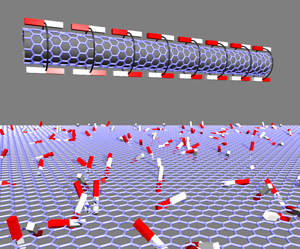
A new scientific discovery could have profound implications for nanoelectronic components. Researchers from the Nano-Science Center at the Niels Bohr Institute, University of Copenhagen, in collaboration with Japanese researchers, have shown how electrons on thin tubes of graphite exhibit a unique interaction between their motion and their attached magnetic field – the so-called spin.
The discovery paves the way for unprecedented control over the spin of electrons and may have a big impact on applications for spin-based nanoelectronics. The results have been published in the prestigious journal Nature Physics.
Carbon is a wonderfully versatile element. It is a basic building block in living organisms, one of the most beautiful and hardest materials in the form of diamonds and is found in pencils as graphite. Carbon also has great potential as the foundation for computers of the future as components can be produced from flat, atom thin graphite layers, observed for the first time in the laboratory in 2004 – a discovery which elicited last year’s Nobel Prize in Physics.
In addition to a charge all electrons have an attached magnetic field – a so-called spin. One can imagine that all electrons carry around a little bar magnet. The electron’s spin has great potential as the basis for future computer chips, but this development has been hindered by the fact that the spin has proved difficult to control and measure.
In flat graphite layers the movement of the electrons do not affect the spin and the small bar magnets point in random directions. As a result, graphite was not an obvious candidate for spin based electronics at first.
New spin in curved carbon
“However, our results show that if the graphite layer is curved into a tube with a diameter of just a few nanometers, the spin of the individual electrons are suddenly strongly influenced by the motion of the electrons. When the electrons on the nanotube are further forced to move in simple circles around the tube the result is that all the spins turn in along the direction of the tube”, explain the researchers Thomas Sand Jespersen and Kasper Grove-Rasmussen at the Nano-Science Center at the Niels Bohr Institute.
It has previously been assumed that this phenomenon could only happen in special cases of a single electron on a perfect carbon nanotube, floating freely in a vacuum – a situation that is very difficult to realize in reality. Now the researchers’ results show that the alignment takes place in general cases with arbitrary numbers of electrons on carbon tubes with defects and impurities, which will always be present in realistic components.
The interaction between motion and spin was measured by sending a current through a nanotube, where the number of electrons can be individually controlled. The two Danish researchers explain that they have further demonstrated how you can control the strength of the effect or even turn it off entirely by choosing the right number of electrons. This opens up a whole range of new possibilities for the control of and application of the spin.
Unique Properties
In other materials, like gold for example, the motion of the electrons also have a strong influence on the direction of the spin, but as the motion is irregular, one cannot achieve control over the spin of the electrons. Carbon distinguishes itself once again from other materials by possessing entirely unique properties – properties that may be important for future nanoelectronics.
Facts about spin in electronics
In current electronics and computer chips signals run as small electric currents. That is to say, the information is carried by the electric charge of electrons, while neglecting their quantum mechanical property, spin. An exception, however, are hard drives where information is written as small magnetic fields on the surface of a disk.
When this information needs to be read again it is precisely the effect of the magnetic fields on the spin of electrons that is used – the effect called magneto resistance, which elicited the Nobel Prize for Physics in 2008. Actually, an entire research field is designated as spin-tronics, a contraction of spin-electronics. Intense work is being done moving towards a greater use of spin properties in electronics, not just the charge.
A vision for the future is the construction computers based entirely on the principles of quantum mechanics and here one simply cannot get around understanding and controlling the spin of individual electrons.



